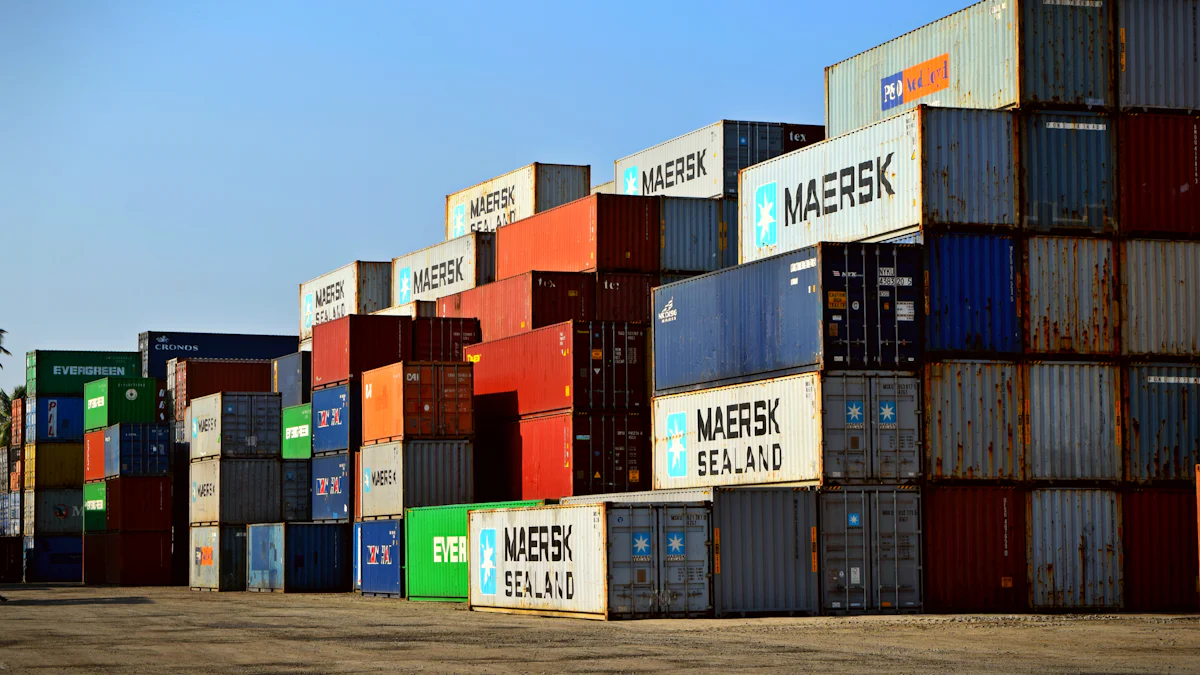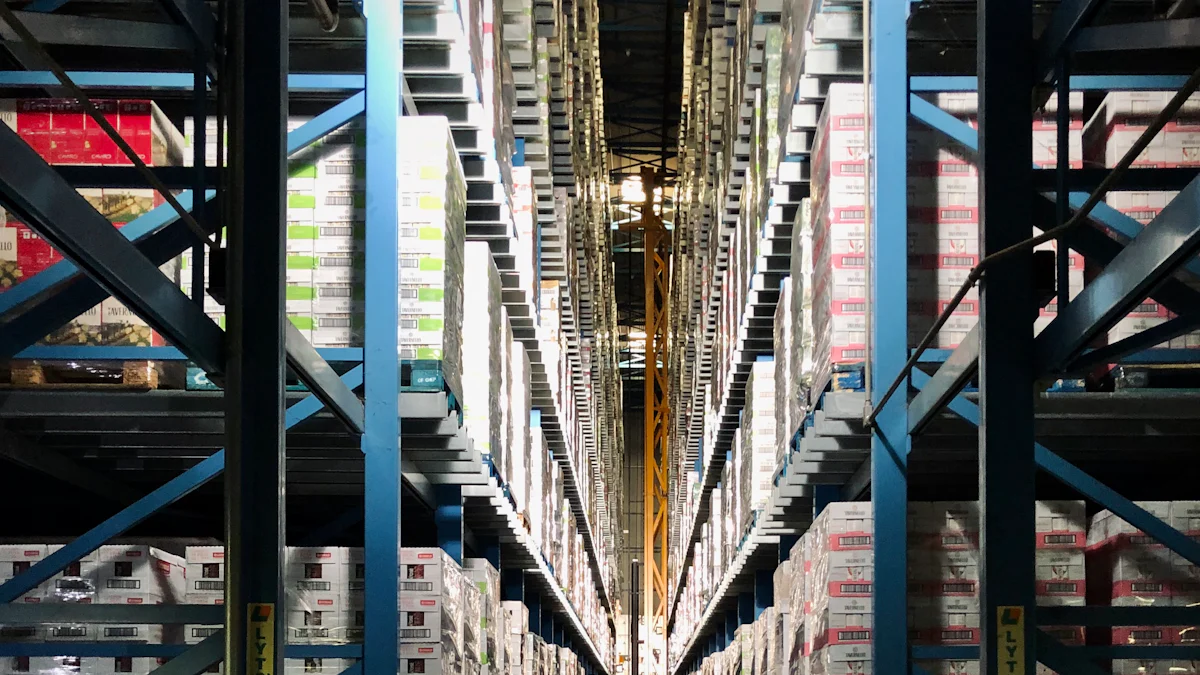Understanding Supply Chain Compliance: A Comprehensive Guide

Supply chain compliance refers to the adherence of companies to relevant laws, regulations, and industry standards throughout their supply chain operations. This process ensures that all aspects of the supply chain meet required legal and ethical standards. Companies often collaborate closely with suppliers, vendors, and partners to maintain compliance. Establishing codes of conduct, supplier agreements, and verification processes helps monitor compliance effectively. Certifications can demonstrate a company's commitment to supply chain compliance and sustainability. Understanding the importance of supply chain compliance in today's business environment is crucial for mitigating risks and ensuring smooth operations.
Defining Supply Chain Compliance
Key Components of Supply Chain Compliance
Legal Requirements
Supply chain compliance involves adhering to various legal requirements. These include customs regulations, tariffs, and environmental policies. Companies must ensure that all products meet safety standards and labeling requirements. Legal compliance also covers international trade regulations and anti-corruption measures. Adhering to these laws helps avoid penalties and maintain smooth operations.
Ethical Standards
Ethical standards play a crucial role in supply chain compliance. Companies must ensure fair treatment of suppliers and avoid exploitation. Ethical sourcing involves selecting suppliers who adhere to labor standards and human rights. Companies should honor contracts and maintain transparency in dealings. Ethical standards also include environmental responsibility and sustainable practices.
Industry-Specific Regulations
Different industries have specific regulations that impact supply chain compliance. For example, the pharmaceutical industry must comply with the Drug Supply Chain Security Act (DSCSA). The food industry follows stringent safety and labeling standards. Compliance with industry-specific regulations ensures product safety and quality. It also helps build trust with customers and partners.
Importance of Supply Chain Compliance
Risk Mitigation
Supply chain compliance is essential for risk mitigation. Companies can reduce legal risks by adhering to relevant laws and regulations. Compliance helps prevent fraud and corruption within the supply chain. Regular audits and assessments can identify potential issues early. This proactive approach minimizes disruptions and ensures smooth operations.
Reputation Management
Maintaining supply chain compliance enhances a company's reputation. Customers and partners value ethical and legally compliant businesses. Compliance demonstrates a commitment to social responsibility and sustainability. A strong reputation can attract new customers and retain existing ones. It also helps build trust and long-term relationships with stakeholders.
Financial Stability
Supply chain compliance contributes to financial stability. Companies can avoid fines and legal penalties by adhering to regulations. Compliance reduces the risk of costly disruptions and delays. Efficient supply chain operations lead to cost savings and improved profitability. Financial stability allows companies to invest in growth and innovation.
Best Practices for Ensuring Supply Chain Compliance

Establishing Clear Policies
Documentation and Record-Keeping
Companies must maintain comprehensive documentation and record-keeping. Proper documentation ensures that all transactions and processes meet legal standards. Records should include contracts, purchase orders, and compliance certificates. Accurate records help trace the origin of products and verify compliance at each stage. Companies should store records securely and make them easily accessible for audits.
Regular Audits and Assessments
Regular audits and assessments play a crucial role in maintaining supply chain compliance. Internal audits help identify potential compliance issues early. External audits provide an unbiased evaluation of compliance practices. Companies should schedule audits periodically and address any findings promptly. Continuous monitoring and assessment ensure ongoing adherence to compliance standards.
Training and Education
Employee Training Programs
Employee training programs are essential for ensuring supply chain compliance. Training should cover relevant laws, regulations, and company policies. Employees need to understand their roles in maintaining compliance. Regular training updates keep employees informed about changes in regulations. Well-trained employees contribute to a culture of compliance within the organization.
Supplier Education
Supplier education is equally important for maintaining supply chain compliance. Companies should educate suppliers about compliance requirements and expectations. Supplier training can include workshops, seminars, and written guidelines. Clear communication helps suppliers understand their responsibilities. Educated suppliers are more likely to adhere to compliance standards, reducing risks for the company.
Technology and Tools
Compliance Management Software
Compliance management software offers a powerful tool for ensuring supply chain compliance. This software automates compliance processes and tracks regulatory changes. Companies can use software to manage documentation, monitor supplier performance, and generate compliance reports. Automation reduces human error and increases efficiency in compliance management.
Real-Time Monitoring Systems
Real-time monitoring systems enhance supply chain visibility and compliance. These systems provide real-time data on supply chain activities. Companies can track shipments, monitor supplier performance, and detect compliance issues instantly. Real-time monitoring allows for quick responses to potential problems. Enhanced visibility ensures that all aspects of the supply chain remain compliant.
Challenges in Supply Chain Compliance
Globalization and Complexity
Diverse Regulatory Environments
Globalization introduces diverse regulatory environments. Each country enforces unique laws and standards. Companies must navigate these varying requirements. Compliance becomes complex with international operations. Understanding local regulations is crucial. Non-compliance risks penalties and operational disruptions.
Supply Chain Visibility
Supply chain visibility remains a significant challenge. Companies need transparency across all supply chain stages. Limited visibility hinders compliance monitoring. Real-time data tracking can mitigate this issue. Advanced technologies enhance visibility. Effective monitoring ensures adherence to compliance standards.
Cost and Resource Allocation
Financial Constraints
Financial constraints impact supply chain compliance. Compliance programs require substantial investment. Small and medium enterprises often face budget limitations. Allocating funds for compliance becomes challenging. Companies must balance costs with compliance needs. Efficient resource management is essential.
Human Resources
Human resources play a critical role in compliance. Skilled personnel are necessary for compliance management. Recruiting and training staff involves significant costs. Companies may struggle with limited human resources. Ensuring adequate staffing supports compliance efforts. Continuous training keeps employees updated on regulations.
Evolving Regulations
Keeping Up with Changes
Regulatory changes occur frequently. Companies must stay informed about new laws. Adapting to changes requires constant vigilance. Regular updates to compliance policies are necessary. Failure to keep up with changes leads to non-compliance. Proactive measures help manage evolving regulations.
Adapting to New Standards
Adapting to new standards presents challenges. Industries introduce new compliance requirements periodically. Companies must modify processes to meet these standards. Implementing changes involves time and resources. Continuous improvement ensures alignment with current standards. Staying adaptable maintains compliance and competitiveness.
Benefits of Supply Chain Compliance

Enhanced Risk Management
Reducing Legal Risks
Supply chain compliance reduces legal risks. Companies adhere to specific laws and regulations. This adherence prevents legal penalties and fines. Legal compliance ensures smooth operations. Companies avoid disruptions caused by non-compliance.
Preventing Fraud and Corruption
Compliance measures prevent fraud and corruption. Companies implement strict verification processes. These processes monitor transactions and supplier activities. Regular audits detect any irregularities early. This proactive approach maintains integrity within the supply chain.
Improved Business Relationships
Building Trust with Partners
Compliance builds trust with business partners. Companies demonstrate commitment to ethical practices. Partners value transparency and reliability. Trust fosters long-term collaborations. Strong partnerships enhance overall business performance.
Customer Satisfaction
Customer satisfaction improves with compliance. Customers prefer companies that follow ethical standards. Compliance ensures product safety and quality. Satisfied customers remain loyal. Positive customer experiences drive repeat business.
Competitive Advantage
Market Differentiation
Compliance provides a competitive edge. Companies differentiate themselves in the market. Adherence to standards showcases commitment to quality. This differentiation attracts discerning customers. Market position strengthens as a result.
Long-Term Sustainability
Long-term sustainability benefits from compliance. Companies invest in sustainable practices. Compliance supports environmental responsibility. Sustainable operations reduce resource wastage. This approach ensures future growth and stability.
FAQs and Common Queries
Addressing Common Concerns
How to Start with Compliance
Companies should begin by understanding relevant laws and regulations. A thorough review of industry standards helps identify compliance requirements. Establishing clear policies and procedures ensures adherence to these standards. Companies must document all processes and maintain accurate records. Regular audits and assessments help monitor compliance efforts.
Dealing with Non-Compliant Suppliers
Non-compliant suppliers pose significant risks. Companies should communicate expectations clearly. Providing training and resources helps suppliers understand compliance requirements. Regular monitoring and audits ensure ongoing adherence. Terminating relationships with persistently non-compliant suppliers protects the supply chain's integrity.
Practical Tips
Quick Wins for Compliance
Automate Processes: Implement compliance management software to streamline operations.
Conduct Training: Regularly train employees on compliance standards and updates.
Perform Audits: Schedule frequent internal and external audits to identify issues early.
Maintain Documentation: Keep comprehensive records of all transactions and compliance activities.
Engage Suppliers: Educate suppliers about compliance expectations and provide necessary resources.
Long-Term Strategies
Invest in Technology: Use real-time monitoring systems to enhance supply chain visibility.
Build a Compliance Culture: Foster a culture where compliance is a priority at all levels.
Stay Informed: Keep up with evolving regulations and update policies accordingly.
Allocate Resources: Ensure adequate financial and human resources for compliance efforts.
Collaborate with Partners: Work closely with partners to maintain high compliance standards throughout the supply chain.
Supply chain compliance holds paramount importance for maintaining trust, credibility, and adherence to laws. Effective management ensures safety, security, and customer satisfaction. Organizations must implement best practices to meet environmental and corporate responsibility standards.
"Compliance with supply chain regulations leads to improved customer satisfaction."
The future of supply chain compliance will see increased emphasis on technology and real-time monitoring. Companies must stay informed about evolving regulations and invest in sustainable practices. Adapting to new standards will ensure long-term success and stability.
See Also
Ensuring Supply Chain Excellence: Your Complete Handbook
Navigating Risks: The Essential Supply Chain Management Guide
Conquering Supply Chain Challenges: An Extensive Manual
Achieving Sustainable Transport in Supply Chains: A Definitive Manual
Jusda: Leading the Way to Supply Chain Resilience Achievement
